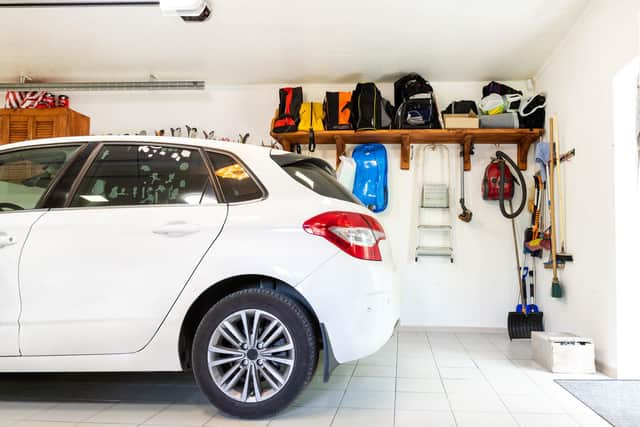Kirsty McLuckie on alternative uses for garages
Garage door company, Garolla published research suggesting the average garage owner in Scotland is storing more than £10,000 worth of items in an area of a property that can be the least secure.
Presumably, the aim of the report is to suggest getting new garage doors, but maybe if you are only using your garage as a dumping room, it’s time to rethink its purpose. Among the battered paint tins with their inch of indeterminate sludge, the piles of recycling, and the large collection of plastic plant pots in our family garage,there are probably some things that are worth a few bob – if only I could locate them when I need them.
Advertisement
Hide AdAdvertisement
Hide AdIt can be a bit of a scramble to the chest freezer, and heaven help you if you actually want to put your hands on a long-handled paint roller, or one of the other lesser-used tools.


What you won’t find in there is a car, as we are one of the estimated two thirds of garage owners in the UK who don’t use the space for securing a vehicle, despite what many tell their insurers.
Having a garage for your car is a benefit to those with no off-street parking, and adding one to allow private parking where street parking is competitive is likely to reap huge benefits.
Building a garage is thought to be one of the more cost-effective home projects, usually adding an average £45,000 to a property’s value, or about twice the build costs of £20,000 to £25,000. A double garage can add more, as it offers potential for use as a workshop.
But that is not the only attraction.
Storage does come into it, which is why a well-organised garage, preferably cleared of junk and perhaps kitted out with shelving, is always recommended when selling.
In particular, homes with little other storage or spare room will have their values boosted by the addition of a garage.
But while viewers will see the advantages of having somewhere to store their bikes, lawnmowers and tools, it is perhaps the future potential a garage offers that makes it most attractive.
Buyers are demanding more flexibility in their homes, and an integral garage will offer the possibility of converting it into something else.
Advertisement
Hide AdAdvertisement
Hide AdGenerally speaking, a garage conversion is one of the most popular ways of adding extra living space. It’s more affordable than a full extension and less prone to planning complications.
With proper damp-proofing, the space can become a utility room. Gyms, home offices, hobby rooms, and playrooms are all uses for the garage that don’t need planning permission, as little will change.
But even if you want to create an extra bedroom or living room, planning is usually not necessary as most conversions fall under permitted development – unless you are in a conservation area, within the bounds of a national park, or if there were special legal conditions attached to the house when it was originally built.
But the pros and cons must always be weighed up – after all, you may be gaining a room, but you will also be losing a garage.
It is worth keeping an eye on local selling prices for similar homes, with and without garages, before embarking on any improvement project designed to add value.
Some buyers search specifically for “house with garage”, and so you may be cutting down potential interest when it comes time to sell.
And even if your conversion is purely to improve your time in the house, you’ll still need to work out where to store those half-empty paint tins.
- Kirsty McLuckie is property editor at The Scotsman